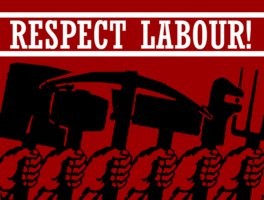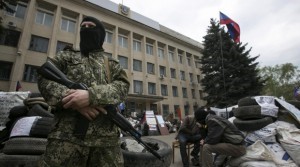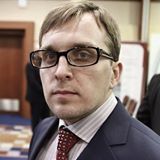We publish below the statement of the Left Opposition collective in Ukraine on the war in the east and the steps it believes are needed to bring it to a halt. Posted originally in Ukrainian by gaslo-info on 15 June 2014. Translated by Marko Bojcun
 It is necessary above all to protect the inhabitants of populated centres from the war. The next steps should be the removal of neo-Nazis from the warfare on both sides, for they are now the ones primarily responsible for inciting the war. Getting out of the social crisis generated by oligarchs’ omnipotence has the potential to overcome the root causes of this confrontation.
It is necessary above all to protect the inhabitants of populated centres from the war. The next steps should be the removal of neo-Nazis from the warfare on both sides, for they are now the ones primarily responsible for inciting the war. Getting out of the social crisis generated by oligarchs’ omnipotence has the potential to overcome the root causes of this confrontation.
One can have different views on what happened on the Kyiv Maidan this winter and the evolution of this mass movement, as well as on people’s democratic right to national self-determination and autonomy. However, one cannot tolerate there being victims among the civilian population, nor can one not see that the utilization of heavy weaponry in densely populated regions of Donetsk and Luhansk brings new victims. Both sides of the conflict admit to the use of artillery and trench mortars. It does not matter to the dead whether bombing an apartment building was intentional or not, nor which side in the conflict is more often targeting housing districts.
It is imperative to cease fire before discussing any kind of political questions about the future constitutional order of Ukraine. We demand the immediate cessation of fire and the withdrawal of heavy weaponry from populated areas. Negotiations about a ceasefire, the release of hostages (the populations of entire cities are now held hostage) and the creation of humanitarian corridors should be held now directly with commanders in the field. Such issues can be negotiated even with the worst terrorists, such as Strelkov, Abver and Bes, if they can indeed ensure the ceasefire. Meanwhile, we categorically oppose any political discussions with the terrorists. Issues concerning the future state organization and the formation of new representative government bodies can be discussed only with the representatives of local communities and not with the visiting militants.
De-escalation of the conflict is possible only when the supply of arms, presently falling in large numbers into the hands of uncontrolled semi-autonomous detachments, will be stopped, and new mercenaries from other countries and regions will be prevented from entering Ukraine. Such mercenaries do not respect the interests of the local population and are rather more interested in continuing the war “until final victory” than in seeking compromise and a peaceful resolution of the conflict. Therefore, we demand from the governments of the Russian Federation and Ukraine to ensure the effective protection of state borders and to prevent the infiltration of arms and any armed people onto the territory of Luhansk and Donetsk regions.
Furthermore, it is necessary to bring to a halt the use of Ukraine as a playing card in the contest between the USA, EU and Russia as they strive to re-divide their zones of influence on the continent. The peaceful citizens of Ukraine are the ones who are paying the price for this. Therefore, alongside our condemnation of Russia’s actions we also demand the cessation of any involvement by the Western states in stoking up this conflict.
Responsibility for halting the supply of modern weaponry and foreign mercenaries to the region lies in the first instance with the Russian Federation. At the same time the Government of Ukraine must bear the responsibility for preventing the entry of semi-partisan “volunteer battalions” of dubious status and authorisation into the zone where the Anti-Terrorist Operation (ATO) is underway. The volunteer battalions “Ukrayina”, “Azov” and others often conduct provocative actions that serve only to foster the consolidation of the local population around the terrorists, who are then accepted paradoxically as their defenders. These battalions, like the Russian mercenaries, are politically motivated to carry on the war.
The main factor that complicates the political resolution of the crisis and undermines trust in state institutions in Luhansk and Donetsk oblasts is the presence on both sides of the confrontation of ultra-right nationalists and even frankly open neonazis. In the ATO leadership, especially in the command and staff of the Ukrainian “volunteer battalions” there are members of the ultra-right nationalist and xenophobic Svoboda party (Sich battalion батальйон „Січ”) and the Right Sector. Often these are people with openly nazi views (we have learned that the “Radical Party of Oleh Liashko” has merged with the ill-reputed “Social-National Assembly”).
We demand the Verkhovna Rada (parliament), the President and the Government of Ukraine remove members of radical nationalist organisations from the operation of the ATO, that they remove them from the zone of the ATO, disarm and disband the units concerned and undertake a lustration of neonazis (denazification) in the Armed Forces of Ukraine, the interior ministry organs and the Procuracy. Additionally, representatives of the Svoboda party should be removed from official positions in the Government of Ukraine.
We call upon the world community to demand that the governments of the USA and the EU member states cease supporting the Government of Ukraine until radical nationalists are removed from official positions in the Government and the Armed Forces, law enforcement bodies and the Procuracy.
At the same time we must point out the considerable number of Russian radical nationalists and frankly open Nazis in the leadership of the self-proclaimed Donetsk People’s Republic (DNR) and Luhansk People’s Republic (LNR). In particular we see in these self-proclaimed entities’ leading positions a lot of citizens of the Russian Federation who only recently were members of neo-nazi organisations that have since been banned there, such as “Russian National Unity”/ (Русское национальное единство) and others.

Neo-nazis from the Social-National Assembly are fighting on the side of Ukraine, and anti-Semites and imperialists are fighting on the side of Russia.
The following “insurgents’” websites are revealing:
http://iks2010.org/ Imperial Cossack Union (Имперский казачий союз)
http://antisionizm.info Anti-Zionism (Антисионизм)
Therefore, we call upon the residents of eastern Ukraine, the local councils in Luhansk and Donestsk oblasts, community organisations and trade unions to work by all acceptable means for the removal at least of Russian neonazis and radical nationalists from the leadership of the self defense detachments of the self-proclaimed DNR and LNR. It is necessary to declare non-confidence in the Russian neonazis who are at this moment attempting to declare themselves the representatives of the population of eastern Ukraine.
We also call upon the world community, in the first instance upon the citizens of the Russian Federation to put pressure on the Russian state authorities in order to compel the Russian Federation to acknowledge the presence of Russian neonazis in Eastern Ukraine and to cease giving them moral and material support.
We also call upon the Russian and Ukrainian mass media to stop whipping up nationalist hysteria and to turn people’s attention instead to the fascists on both sides of this confrontation.
We call upon the representatives of local communities of Eastern Ukraine and the Government of Ukraine to join in a public political dialogue, the first subject of which should be the transparent, democratic re-election of the local councils. The question of admitting observers from Ukrainian and international organisations should be decided. In our view community and trade union organisations should take on the responsibility for ensuring adherence to the terms of an agreement between the sides in the conflict in the Donbas. On the one hand they are independent of the oligarchs, and on the other they are clearly delineated from radical nationalist organisations, of both pro-Russian and pro-Ukrainian orientation.
It is no secret that the representatives of civil society and workers’ trade union organisations have until now taken practically no part in the events occurring in this industrial region. At the same time, where workers’ organisations have dared to take the situation under their own control they did not allow disorder or the escalation of violence. For example, the strike committee in Krasnodon, Luhansk oblast prevented any violence from taking place during the general strike there. The independent workers unions in Kryviy Rih have experience in forming their own self-defense detachments, which played an important role in preventing provocations and force being used during the protests on the Maidan of Kyviy Rih Basin. Workers’ organisations and the miners’ self defense detachments could become the most active force capable of restoring order in the Donbas.
Without a doubt Ukraine and its inhabitants are being used as small change in the geo-political contest between the imperialist powers for spheres of influence, resources and markets. However, the reasons for the emergence of the mass movements of the Maidan and the anti-Maidan, notwithstanding their very different characteristics, lie not so much in the influence of external forces or the forces of corruption inside the country as they do in the oligarchic socio-economic system, in the carefully built political and state institutions which over decades have been under the full control of the business oligarchy. It is the oligarchs, who pay practically no taxes in Ukraine and systematically plunder the country’s wealth and take it abroad, who brought the country to a social explosion. This explosion took place under nationalist slogans because of the lack of a sufficiently strong workers’ movement. At the same time the slogans of social justice were the key ones for the majority of participants in those mass actions on the Maidan and the anti-Maidan.
Social peace will be impossible to achieve in Ukraine until the social crisis is resolved. This crisis has sharpened unbelievably in the wake of the hryvnia’s devaluation and the fall in production in most sectors of the economy triggered by the instability. The government and the oligarchs who stand behind it, instead of seeking ways to resolve the crisis, are using the military threat and the ATO as cover for their anti-social policies. Tenders for military orders which are taking place according to a simplified procedure – these are multi–million orders for private corporations and an opportunity for state officials to steal public funds. But the oligarchs are increasing their profits not just by enriching themselves through contracts to deliver military supplies. Most of the export-oriented firms of the mining and metallurgical complex have taken advantage of the devaluation of the hryvnia to improve their financial position. Profits have doubled in many enterprises. Which is not surprising considering that they pay the workers in hryvnia and sell their products for hard currency.
And alongside that, whilst knowing full well that they are already robbing the workers and provoking a social explosion the oligarchs can’t restrain themselves from grabbing even more. Despite the fact that Ihor Kolomoisky, governor of Dnipropetrovsk, officially acknowledged the need to increase workers’ pay by at least 20%, most enterprises are in no hurry to use some of their super profits to compensate for the workers’ losses in their real income. The situation is unfolding in Kryviy Rih in such a way that the oligarchs’ stubbornness may well provoke a general strike in this million-strong city. As the likelihood of mass strikes grows all the more, it becomes more difficult to say what kind of character they will assume. Will the miners dare to pose the question of resolving the situation in the country as a whole, and not just the either own pay and self defense?
A general strike could become a real lever to influence all sides in the conflict and ensure a swift halt to the war in deed, not just in words. The question is whether the workers can organise themselves effectively enough and to put forward relevant demands, that is general political demands. In such an eventuality an important factor will be the ability of the workers’ self defense to safeguard the strikers from the pressure of the state and the oligarchs. Indeed, one cannot exclude the possibility that attempts will be made to use “volunteer battalions” not against the separatists but against the independent workers movement in all oblasts.
We demand from Ukrainian, Russian and Western businessmen who control enterprises in Ukraine that they stop profiting from the crisis and immediately raise workers’ pay in their enterprises to a level that equals at least the real wage in 2007-08.
Cancellation of Ukraine’s debt to the IMF is also part of the solution: this crippling financial burden imposed by foreign creditors does not permit us to deal with our domestic problems.
Considering all this, we support the general direction of the statement adopted recently in Minsk http://www.criticatac.ro/lefteast/zimmerwald-2014-stop-the-war-in-ukraine/ . We understand very well and completely support the desire of left activists in Ukraine and neighbouring countries to express their class position and their internationalist anti-war position. The problem with this statement is that it is not so much the expression of an agreed position as it is the result of a rotten compromise. It is written in such a way as to hide the absence of an agreed position by using general and vague phrases which each of the signatories can interpret as they wish – often in direct contradiction to one another.
From this flows the second shortcoming of the statement: the eclectic and unrealistic nature of its stated demands. So, in the first point it calls for the withdrawal of Ukrainian armed forces from Donetsk and Luhansk oblasts, and in the second it calls for the full disarmament of the armies of the DNR and LNR. It is not clear whether the local population actually supports handing over all the functions of government exclusively to some small bands that are under no-one’s control, to say nothing of the evident unreality of such a scenario.
Therefore, we call for the formation of a powerful anti-war movement whose concrete, general demand should be an immediate cease fire and a cessation in the use of heavy weapons. We hope this slogan can be and will be supported by the public at large in all oblasts of Ukraine as well as abroad.








